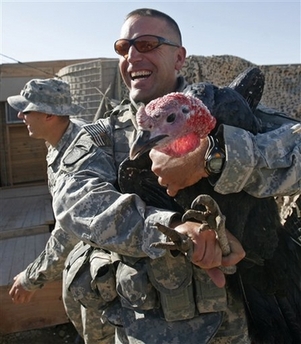Democrats' bill on Iraq wouldn't end war
Updated: 2007-11-23 16:00
WASHINGTON - The Democrats' flagship proposal on Iraq is aimed at bringing most troops home. Yet if enacted, the law would still allow for tens of thousands of US troops to stay deployed for years to come.
This reality — readily acknowledged by Democrats who say it's still their best shot at curbing the nearly five-year war — has drawn the ire of anti-war groups and bolstered President Bush's prediction that the United States will most likely wind up maintaining a hefty long-term presence in Iraq, much like in South Korea.
For those who want troops out, "you've got more holes in here than Swiss cheese," said Tom Andrews, national director of the war protest group Win Without War and a former congressman from Maine.
 Lt. Col. Andrew Rohling from the 3rd Brigade combat team of 101st Airborne Division smiles as he holds a turkey at the Patrol Base Shanghai some 20 kilometers (about 12,4 miles) south of Baghdad, Iraq, on Thanksgiving Thursday, Nov. 22, 2007. [Agencies] |
The Democratic proposal would order troops to begin leaving Iraq within 30 days, a requirement Bush is already on track to meet as he begins reversing this year's 30,000 troop buildup. The proposal also sets a goal of ending combat by Dec. 15, 2008.
After that, troops remaining in Iraq would be restricted to three missions: counterterrorism, training Iraqi security forces and protecting US assets, including diplomats.
This month, Senate Republicans blocked the measure, even though it was tied to $50 billion needed by the military, because they said it would impose an artificial timetable on a war that has been showing signs of progress.
Despite the GOP's fierce opposition and a White House veto threat, military officials and analysts say the proposal leaves open the door for a substantial force to remain behind. Estimates range from as few as a couple thousand troops to as many as 70,000 or more to accomplish those three missions.
There are about 164,000 troops in Iraq now.
Maj. Gen. Michael Barbero, deputy chief of staff for operations in Iraq, declined to estimate how many troops might be needed under the Democrats' plan but said it would be hard to accomplish any of those missions without a significant force.
"It's a combination of all of our resources and capabilities to be able to execute these missions the way that we are," Barbero said in a recent phone interview from Baghdad.
For example, Barbero said that "several thousand" troops are assigned to specialized anti-terrorism units focused on capturing high profile terrorist targets. But they often rely on the logistics, security and intelligence provided by conventional troops, he said.
"When a brigade is operating in a village, meeting with locals, asking questions, collecting human intelligence on these very same (terrorist) organizations, that intelligence comes back and is merged and fed into this counterterrorism unit," Barbero said. "So are they doing counterterrorism operations?
"It's all linked and simultaneous," he added. "You can't separate it cleanly like that."
It's also difficult to precisely say how many US troops are tasked with training the Iraqi security forces.
|
|
|
||
|
||
|
|
|
|

